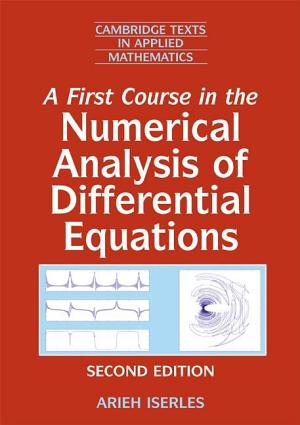Math 450
Numerical Methods for Differential Equations, Spring 2020
NOTE: This is a revised syllabus, covering the portion of the term after the transition to remote instruction on March 23, 2020. Click here to see the old syllabus, which this replaces.
Basic Information
Instructor: Ari Stern
Email: stern@wustl.edu
Office Hours: TuTh 1:30-3pm (via Zoom, accessed
through Canvas)
Course Announcements
Most communication about the course will take place through Canvas announcements, so please make sure that you have notifications turned on and check them regularly.
Homework Assignments
Problem sets will be posted to Canvas approximately biweekly, and solutions will be submitted by uploading them before the specified due date and time. For handwritten work, I recommend using a scanner app on your phone to photograph the pages and upload them as a single PDF. (Of course, if you have an actual scanner, that works even better.) For typed work, including Python code and output, most OSes give you the option to "print" to a PDF file instead of a physical printer.
You are encouraged to discuss the homework with your fellow students and to collaborate on problems, but your final write-up (including code) must be your own. Please make sure that your solutions are written clearly and legibly.
Madison Ihrig (madison.ihrig@wustl.edu) is responsible for grading the homework assignments.
Lectures
Lectures will be held MWF 3-3:50pm, live via Zoom. These lectures will also be recorded to the cloud for later viewing. Live lectures and recordings will both be accessed through Canvas using the Zoom link in the navigation bar. The last lecture will be on Friday, April 24.
Exams
The midterm exam was held in class on Wednesday, March 4. The final exam will be held on Thursday, April 30, and will be posted to Canvas and handed in electronically via file upload (just like homework assignments). In advance, I will announce what time the exam will be posted and the deadline for submission, which will be at least 12 hours after posting. This longer time window is intended to accommodate scheduling and time-zone issues, disability extra-time accommodations, and the additional time needed to scan and upload your solutions.
Grading
Grades will be based on a weighted average of homework (40%, lowest score dropped), midterm exam (20%), and final exam (40%).

Textbook
The text for this course is A First Course in the Numerical Analysis of Differential Equations, by Arieh Iserles, published by Cambridge University Press. I plan to cover most of the material from Chapters 1-5 and 8-9 of the textbook, along with selected additional topics.
Software
The programming component of this class is based on the Python programming language with the SciPy collection of numerical and scientific computing tools. No previous experience with either is assumed (although I will assume familiarity with scientific computing, in some programming language, from Math 449). This software is free and open source, and can be installed on your own computer.
The Anaconda Python Distribution based on Python 3 is officially recommended for this course, and is available for Linux, Mac, and Windows.
Academic Integrity
All students are expected to adhere to high standards of academic integrity, as specified in the undergraduate student academic integrity policy. Since this course is offered through the College of Arts & Sciences, any violations of this policy will be referred to the College’s Academic Integrity Officer. Violations of this policy include, but are not limited to:
- homework collaboration exceeding that permitted in the Homework Assignments section above (e.g., preparing your final write-up side-by-side with another student rather than independently, copying another student's solutions or code);
- submitting the work of others as your own (e.g., copying solutions or code found online);
- exam misconduct (e.g., copying another student's exam or knowingly allowing your exam to be copied, giving or receiving unauthorized assistance, use of unauthorized books/notes or other materials, unauthorized use of electronic devices, etc.).
If you have any questions, or are unsure about what is permitted/prohibited by this policy, please ask me.
In many cases, academic integrity violations are the result of getting behind in coursework and making bad decisions under pressure. Keep up with your assignments, ask questions when you are unsure what is expected of you, and do not give in to the temptation to cut corners.
Catalog Description
Application and analysis of numerical methods for ordinary and partial differential equations. Specific topics may include: Runge-Kutta methods, geometric numerical integrators, finite difference methods, finite element methods, spectral methods, etc. Prerequisites: Math 449 or permission of instructor.